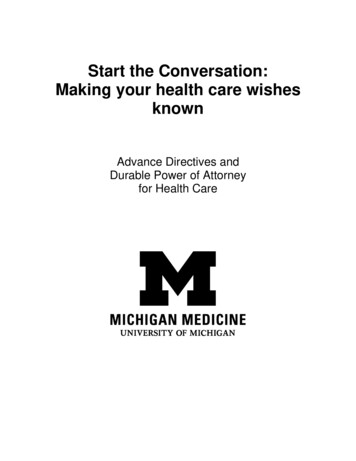
Transcription
Start the Conversation:Making your health care wishesknownAdvance Directives andDurable Power of Attorneyfor Health Care
Advance Directive ToolkitThis toolkit has five parts. It lets you:Before You Begin: Learn about Advance Directives. (Page 3)This section helps you to learn about planning for health careand the forms that you need to complete.Form Part A: Make your health care wishes known. (Page 8)This form lets you write down the kind of health care youwant to help guide your Patient Advocate. This way, thosewho care for you will not have to guess what you want if youare too sick to tell them yourself.Form Part B: Choose a Patient Advocate. (Page 14)A Patient Advocate is a person who can make medicaldecisions for you if you are too sick or unable to make themyourself.Form Part C: Sign the form. (Page 15)You must sign the form before it can be used.Form Part D: Ask your Patient Advocate to sign. (Page 17)Your Patient Advocate must sign on page 17 to agree to beyour Patient Advocate.Fill out only the parts you want. If you only want to list your own health care wishes go to Part A (Page 8). If you only want to name a Patient Advocate go to Part B (Page 14). If you want both then fill out Part A and Part B.Always sign the form with 2 witnesses in Part C (Page 15).1
Advance Directives ChecklistUse this checklist as a helpful guide when considering your preferencesand completing the forms in this booklet.Read this toolkit cover to cover.Write down all your questions.Discuss your questions with your doctors, family, friends and spiritualadvisers.Identify a person to serve as your Patient Advocate (and an alternatePatient Advocate).Talk with this person and make sure that they are willing to serve asyour Patient Advocate. Tell them about your wishes.Complete Part A (Make Your Health Care Wishes Known) and Part B(Appoint a Patient Advocate) of this toolkit.Identify 2 people who are not your Patient Advocate, your familymembers or part of your health care team who can serve as witnesses.Sign the form in front of the witnesses.Have the witnesses sign the form.Have your Patient Advocate sign the form.Make several copies of the signed form.Save a copy for yourself. Keep it in a safe and easily accessible place.Give copies to your Patient Advocate, health care provider, family, andfriends.Review this document regularly2
Before You BeginWhy is planning for health care important?You always have the right to be included in any decisions related to the healthcare you receive. However, no one knows what the future holds, and there maybe a time when you are unable to make your own decisions. By reviewing thistoolkit and stating your wishes for health care, you can make sure that peopleclose to you and people who provide health care for you know what types ofdecisions you would make for yourself.How can I start?Writing down your preferences is a good way to start planning for your healthcare. An Advance Directive is a written statement about your wishesregarding medical treatment. In the State of Michigan, the Durable Power ofAttorney for Health Care (DPOA-HC) form is the most widely used AdvanceDirective. The DPOA-HC allows you to name your Patient Advocate and is alegal document in Michigan.What is a Patient Advocate?A Patient Advocate is the person who can make medical decisions for you ifyou are too sick or unable to make them yourself. Naming a Patient Advocateis your DPOA-HC. A Patient Advocate can only make your medical decisions if2 doctors agree that you cannot make your own decisions and this is written inyour record. Your Patient Advocate will make decisions that you would beasked to make if you were able.Whom should I choose to be my Patient Advocate?A family member or friend who: Is at least 18 years old. Knows you well. Can be there for you when you need them. You trust to do what is best for you and follow your wishes, even if they donot agree with your wishes. Can tell your doctors about your health care wishes.3
What will happen if I do not choose a Patient Advocate? If you are too sick to make your own decisions, your doctors may ask yourclosest family members to make decisions for you. If your family members cannot make a decision or agree on a decision, thena judge may appoint someone to make decisions for you. You will receive care even if you do not choose a Patient Advocate.What kind of decisions can my Patient Advocate make?Based on your wishes, your Patient Advocate can: agree to, say no to, change,stop or choose any of the following: Doctors, nurses, social workers Hospitals or clinics Medications, tests, or treatments Whether or not you receive life support treatments Whether or not you receive surgery Whether or not to take you to a hospital or nursing home What kind of comfort care you receive, including hospice careYour Patient Advocate may look at your medical records to help make thesedecisions.The law defines your Patient Advocate named in your DPOA-HC as yoursurrogate decision maker. This means that they will make medical decisionsfor you. This is why it is very important to share your wishes with your PatientAdvocate.The preferences you write down on this form should serve as a guide for yourPatient Advocate and doctors, but they are not legally binding.A properly completed DPOA-HC is legally recognized and allows your PatientAdvocate to make medical decisions for you when you cannot.4
What do I do with the form after I fill it out and everyone has signed? Bring a copy of this form to your doctor’s office or hospital so it can bescanned into your medical record. Share a copy of the form with others who care for you, such as:o Your Patient Advocateo All of your doctorso Nurseso Social workerso Family and friends Keep a copy for yourself in a safe and easy to find place.Talk with your Patient Advocate about your choices.Can I change my mind? You can change your mind at any time. Any spoken wish about a medical treatment must be honored by a PatientAdvocate, even if it is different than what you put in your form. If you change your mind, it is best to fill out and sign a new form.o Tell those who care for you about your changes.o Give the new form to your Patient Advocate and your doctors.What if I have questions about the form? Bring it to your doctors, nurses, social workers, Patient Advocate, family orfriends to answer your questions.What if I want to write down health care wishes that are not on thisform? Write your wishes on a piece of paper, sign and date the paper. Keep the paper with this form. Share your wishes with those who care for you.5
Where can I learn more?Talk to your health care provider, such as your doctor or a social worker in theoffice. If you would like to speak with a social worker, please call the GuestAssistance Program at 800-888-9825 and they will assist you.You can also visit the Advance Care Planning page on the U-M Patient EducationClearinghouse at .At the website, you can find more information on advance care planning andAdvance Directives, including: Frequently Asked Questions on advance care planning andAdvance Directives. Additional Advance Directive documents, including a Do NotResuscitate (DNR) Declaration form, a Durable Power ofAttorney (DPOA – HC) for Mental Health Care Choice, and aFuneral Representative Designation form. Additional resources to write down your wishes including, LivingWill forms and conversation tools.6
Making Your Wishes KnownandNaming Your Patient Advocate (DPOA-HC)7
PATIENT INFORMATIONPart A: Make Your Health Care Wishes KnownUse this section to state your preferences for health care.This section is not legally binding in the state of Michigan, but it canserve as a helpful guide to your doctors and your Patient Advocate.You may answer or skip any of the questions in Part A.Your Thoughts on LifeWhen you think about the things that make life worth living, which of thefollowing apply to you: (pick one) My life is always worth living, no matter how sick I am. My life is worth living only if I can do some of the things that aremeaningful to me. I am not sure.If you chose the second option, put an (X) next to all the sentences you mostagree with: My life is only worth living if I can: Talk to family or friends. Wake up from a coma. Feed, bathe, or take care of myself. Be free from pain. Live without being hooked up to machines. Live at home (as opposed to a nursing home). Other: I am not sure.If I am dying, I prefer to die: (pick one) At home. At a facility (hospital, hospice, or nursing home). I am not sure.8Your Wishes and DPOA-HC Form
PATIENT INFORMATIONIs religion or spirituality important to you? No YesIf you have one, what is your religion?What should your doctors know about your religion or spirituality? I am not sure.Do you have any hopes for your funeral or memorial service? You can includeinformation on music, readings, or any other requests that you may have. I am not sure.Do you have any other wishes or thoughts on life that you would like to share?You can include information on how you would like to be treated, madecomfortable, or any other requests that you may have. I am not sure.9Your Wishes and DPOA-HC Form
PATIENT INFORMATIONYour Wishes About Organ DonationYour doctors may ask about organ donations after you die. Donating(giving) your organs can help save lives. Please tell us your wishes.If your Patient Advocate is not next-of-kin and you would like your PatientAdvocate to make choices on your behalf after you have died, pleasecomplete a Funeral Representative Designation Form.Put an (X) next to the one choice you most agree with. I want to donate all my organs. I want to donate only these organs: I do not want to donate my organs. I want my Patient Advocate to decide. If you let your Patient Advocatedecide, they can make that choice after you die. I am not sure.Do you have any additional thoughts on donating your organs?If you do, please write them here.10Your Wishes and DPOA-HC Form
PATIENT INFORMATIONMaking Your Wishes About Life Support KnownIf you cannot speak for yourself, your Patient Advocate will make decisionsabout life support for you. Life support treatments are medical care to tryand help you live longer.Talk with your health care provider, your family members,and Patient Advocate about the kind of treatment you doand do not want.Most medical treatments can be tried and then stopped if they do not help. It isimportant to talk with your health care providers about these choices.If you are sick, your doctors and nurses will always try to keep you comfortableand minimize your pain. They will try to do what is best for you.Please read all options below before you make your choice. Select one option.If I am so sick that I am dying: I want doctors to try all treatments that they think might help, includinglife support even if it may not help me get better. I want doctors to do everything they think might help me, but, if I amvery sick and have little hope of getting better, I do not want to stay onlife support. I want to die a natural death. I want no life support treatments. I want my Patient Advocate to decide for me with the help of informationfrom my doctors and my thoughts on life. I am not sure.11Your Wishes and DPOA-HC Form
PATIENT INFORMATIONIf you have any specific preferences for treatments, please write them here:In the event you are dying, your Patient Advocate can: Call in a spiritual leader. Enroll you in hospice care. Decide if you die at home, if possible, or in the hospital. Ensure your comfort and pain control.My other wishes for my health care:12Your Wishes and DPOA-HC Form
PATIENT INFORMATIONYour Instructions to Your Patient AdvocateIf you would like to let your Patient Advocate make decisions that mightallow you to die when you are very sick, please sign under the statementbelow.Michigan law allows your Patient Advocate to refuse or stop life supporttreatments or CPR only if you give your Patient Advocate that power.If you would like to give your Patient Advocate that power, sign below. If youwould prefer not to give your Patient Advocate that power, you may skip thissection.I want my Patient Advocate to make decisions about life supportand treatments that would allow me to die when I am very sick.When making these decisions, I want my Patient Advocate to followthe guidelines I have provided.Sign your name here to give this power to your Patient AdvocateShow your Patient Advocate this form.Tell them what kind of medical care you want.13Your Wishes and DPOA-HC Form
PATIENT INFORMATIONDURABLE POWER OF ATTORNEY (DPOA-HC)Part B: Appoint a Patient AdvocateYour NameDate of BirthYour Patient Advocate is the person who can make medical decisions for you ifyou are too sick or unable to make them yourself.If you are very sick and 2 doctors decide that you cannot make your ownmedical decisions, they will ask that your Patient Advocate make them for you.Select someone you trust to make the decisions you would want. You may alsoname one or more persons to make the decisions if your first choice cannot.These additional persons would be your successor or secondary PatientAdvocates.I want this person to be my Patient Advocate if I can no longer make my medicaldecisions for myself.First NameLast NameStreet AddressCityStateHome phone numberWork phone numberZipCell phone numberIf the first person cannot do it, then I want this person to make my medical decisionswhen I cannot and be my successor Patient Advocate.First NameLast NameStreet AddressCityStateHome phone numberWork phone numberZipCell phone number14Your Wishes and DPOA-HC Form
DURABLE POWER OF ATTORNEY (DPOA-HC)PATIENT INFORMATIONPart C: SignaturesBefore this Advance Directive can be used, you must: Sign this form on page 16. Have 2 witnesses sign the form on page 16.Your witnesses must: Be at least 18 years of age. See you sign this form and sign it on the same day.Your witnesses cannot: Be your Patient Advocate. Be your health care provider. Work for your health care provider. Work at the place where you live (if you live in a nursing home or grouphome). Be your spouse, your parent, your child or grandchild, or your brother orsister. Benefit financially (get any money or property) after you die. Work for your insurance company.Your 2 witnesses do not need to read this Advance Directive.They do need to watch you sign the form and sign it themselves on the sameday.They sign to promise that while you signed the form, you appeared to bethinking clearly and were not forced to sign it. Some examples of whom yourwitnesses could be include neighbors, members of church, or friends.You do not need a notary or a lawyer to complete this form.15Your Wishes and DPOA-HC Form
DURABLE POWER OF ATTORNEY (DPOA-HC)PATIENT INFORMATION1. Your SignatureSign your nameDatePrint Your First NamePrint your Last NameStreet AddressCityStateZipDate of Birth (Month/Day/Year)2. Witnesses’ SignaturesBy signing, I promise that signed this form while I watched.(patient name)They appeared to be thinking clearly and were not forced to sign it.Witness #1Sign your nameDatePrint Your First NameStreet AddressPrint your Last NameCityStateZipWitness #2Sign your nameDatePrint Your First NameStreet AddressPrint your Last NameCityStateZip16Your Wishes and DPOA-HC Form
PATIENT INFORMATIONDURABLE POWER OF ATTORNEY (DPOA-HC)Part D: Acceptance by Patient AdvocateYour Patient Advocate must read and sign this form.As the Patient Advocate: You should always act with the patient’s best interests and not your owninterests. You will only start making decisions for the patient after 2 doctors agree thatthe patient is too sick to make his or her own decisions. You will not be able to make decisions that the patient would not usually beable to make. You don’t have the power to stop a pregnant patient’s treatment if it wouldcause her to die. You can make a decision to stop or not start treatments and allow the patientto die naturally if they have made it clear that you can make that decision. You cannot be paid for your role as a Patient Advocate but you can get paidback for the money you spend on the patient’s medical expenses. You should help to protect the patient’s rights as defined by law. You cannot make decisions that go against the patient’s wishes regardingorgan donation. The patient can remove you as Patient Advocate whenever they want. You can remove yourself as Patient Advocate whenever you want.By signing, I am saying that I understand what this document says and that Iwill be the Patient Advocate for (name of patient).Patient Advocate’s SignatureDate2nd Patient Advocate’s SignatureDate17Your Wishes and DPOA-HC Form
Advance Directives Final ChecklistUse this checklist as a helpful guide to make sure the you have: Chosen a trusted person to be your Patient Advocate. Identified 2 people who are not your Patient Advocate, your familymembers, or part of your health care team to be your witnesses. Signed the form in front of the witnesses. Had your witnesses signed the form. Had your Patient Advocate signed the form.What do I do next? Make copies of your form. Give a copy to your health care provider. Ask your health care provider to put the form in your Medical Record. Give a copy to your Patient Advocate. Give copies to your family and friends. Keep your copy in a safe and easy to find location. Review the form once a year or as needed.If you do not agree with the information in your form, complete a newform.If you do agree, you can reaffirm the form in the space provided below: Date Initial Date Initial Date Initial Date Initial If you would like to, complete the card below and store it in your wallet:Print your nameSignatureDate I have a Durable Power of Attorney for HealthCareI have discussed my care with my patientadvocate, family, and doctor. If I am unable tospeak for myself, please contact:Advocate NameTelephone Number
(c) 2017 Regents of the University of Michigan. Advance Directives: Have a say about how youwant to be treated if you get very sick is made available under a Creative Commons AttributionNonCommercial-ShareAlike 4.0 License.Adapted from: California Advance Health Care Directive, (c) 2015 Rebecca Sudore, MD. Available underthe Creative Commons Attribution-NonCommercial-ShareAlike 2.0 License. Advance Directives and Durable Power of Attorney for Health Care by Henry Ford HealthSystem. (Derivative work of the above). Available under the Creative CommonsAttribution-NonCommercial-ShareAlike License.
Discrimination is Against the Law!Michigan Medicine complies with applicable federal civil rights laws and does not discriminate on thebasis of race, color, national origin, age, disability or sex.Michigan Medicine does not exclude people or treat them differently because of race, color, nationalorigin, age, disability or sex.Michigan Medicine provides free aids and services to people with disabilities to help communicateeffectively while receiving care, such as: Qualified sign language interpreters; and Written information in other formats (large print, audio, accessible electronic formats and otherformats).Michigan Medicine provides free language services to people whose primary language is not English,such as: Qualified language interpreters; and Information written in other languages.If you need these services while at Michigan Medicine, contact Interpreter Services at 734-936-7021.If you believe that Michigan Medicine has failed to provide these services or discriminated in anotherway on the basis of race, color, national origin, age, disability or sex, you can file a grievance with:Patient Civil Rights CoordinatorMichigan Medicine2901 HubbardAnn Arbor, Michigan 48109-2435Phone - (734) 936-6439Fax - (734) 347-0696Email - MichMed patients rights@med.umich.eduYou can file a grievance in person, by mail, fax, or email. If you need help filing a grievance, thePatient Civil Rights Coordinator is available to help you.You can also file a civil rights complaint with the U.S. Department of Health and Human Services, Officefor Civil Rights. This can be done electronically, through then Office for Civil Rights Complaint Portal,available at https://ocrportal.hhs.gov/ocr/portal/lobby.jsf, by mail or phone at:U.S. Department of Health and Human Services200 Independence Avenue SWRoom 509F, HHH BuildingWashington, DC 202011-800-368-1019, 800-537-7607 (TDD)Complaint forms are available at:http://www.hhs.gov/ocr/office/file/index.html.
Wenn Sie Deutsch sprechen, stehen für Sie kostenlosSprachassistenzdienste zur Verfügung. Rufen Sie 844‐562‐3984 anund lassen Sie sich mit dem Dolmetscherdienst unter derRufnummer 734‐936‐7021 verbinden. Informationen über IhreRechte und Pflichten als Patient erhalten Sie über IhrenGesundheitsdienstleister bei Michigan Medicine.Si usted habla español tiene a su disposición servicios gratuitos deasistencia lingüística. Llame al 877‐810‐4719 y pida que le conectencon la oficina de los Servicios de Interpretación al 734‐936‐7021. Sidesea usted obtener información con respecto a sus derechos yresponsabilidades como paciente consulte, por favor, con suproveedor de atención médica de Michigan Medicine. أتصل . فخدمات المساعدة اللغوية متوفرة مجانا ً لك ، إذا كنت تتحدث اللغة العربية واطلب التواصل مع مكتب خدمات الترجمة الشفوية على 855 - 800 - 9252 على إذا كنت ترغب في معلومات متعلقة بحقوقك .734 - 936 - 7021 الرقم ". يرجي أن تطلب من مقدمي رعايتك في "طب ميتشيجان ، ومسؤولياتك كمريض �免费服务。请打 ��学部的提供者咨询。Nếu bạn nói tiếng Việt, chúng tôi có dịch vụ hỗ trợ ngôn ngữ miễnphí dành cho bạn. Hãy gọi đến số 844‐590‐8944, và yêu cầu đượckết nối với văn phòng Dịch Vụ Thông Dịch theo số 734‐936‐7021.Nếu bạn muốn thông tin về quyền và trách nhiệm của mình với tưcách là bệnh nhân, vui lòng hỏi bác sĩ chăm sóc Michigan Medicinecủa bạn.Nëse ju flisni shqip, atëherë ju ofrohen shërbime gjuhësore, papagesë. Thirrni numrin 844‐562‐3982 dhe kërkoni që t'ju lidhin mezyrën e përkthyesve në numrin 734‐936‐7021 dhe tregoni se cilëngjuhë e flisni. Nëse dëshironi informacion në lidhje me të drejtat dhepërgjegjësitë tuaja si pacient, ju lutemi kontaktoni dhe pyesniofruesin e kujdesit shëndetësorë të Michigan Medicine.한국어를 하시는 분들께 통역 서비스가 무료로 제공됩니다.855‐938‐0571 로 전화하셔서, 통역 서비스 사무실 전화번호인 734‐936‐7021 로 연결해주도록 요청하십시오.환자로서의 권리와 책임에 관한 정보를 원하시면, 미시간메디신 (Michigan Medicine) 의 의료진에게 문의하십시오.আপিন বাংলায় কথা বলেল, িবনামূেলয্ েদাভাষী পিরেষবা পােবন।734‐936‐7021 নmের আমােদর েদাভাষী পিরেষবার aিফেস েফান কেরআপনার ভাষার (Bengali) নাম বলুন।aংশgহণকারী িহসােবআপনার aিধকার o কতর্ েবয্র সmেকর্ জানেত চাiেল আমােদরিমিশগান েমিডিসন েকয়ার েpাভাiডােরর সেেযাগােযাগ ক ন।Jeśli mówisz po polsku, możesz skorzystać z bezpłatnych usługtłumaczeniowych. Zadzwoń pod nr 844‐562‐3986 i poproś opołączenie z biurem usług tłumaczeniowych pod nr 734‐936‐7021.W przypadku chęci uzyskania informacji dotyczących praw iobowiązków pacjenta zwróć się do dostawcy usług medycznychMichigan Medicine.Si parla italiano, avrà gratuitamente a disposizione servizi gratuiti diassistenza linguistica. Chiami il numero 844‐562‐3985 e chieda diessere messo in contatto con l’ufficio per i servizi di interpretariato(Interpreter Services) al numero 734‐936‐7021. Se desiderainformazioni sui suoi diritti e responsabilità come paziente, consultiil suo referente sanitario Michigan ��す。855-322-5032 7021 �。Если Вы говорите по‐русски, услуги переводчиков будутпредоставлены Вам бесплатно. Звоните по телефону 855‐938‐0572 и попросите, чтобы Вас соединили со службойпереводчиков по телефону 734‐936‐7021. Если Вы хотитеполучить информацию о правах и обязанностях пациента,попросите об этом Вашего врача из системы МичиганскойМедицины.Ako govorite hrvatski/srpski, dostupna Vam je besplatna podrška naVašem jeziku. Kontaktirajte našu prevoditeljsku službu na broj 734‐936‐7021 i recite kojim jezikom govorite (Serbo‐Croatian). Ako seželite informirati o svojim pravima i obvezama kao pacijenta, molimoVas da se obratite pružatelju skrbi u sklopu Sveučilišta Michigan.Kung nagsasalita ka ng Tagalog, may mga magagamit kang librengserbisyo sa tulong sa wika. Magtanong sa tanggapan ng aming MgaSerbisyo ng Interpreter sa 734‐936‐7021 at tukuyin ang iyong wika(Tagalog). Kung gusto mong makakuha ng impormasyon tungkol saiyong mga karapatan at responsibilidad bilang isang pasyente,mangyaring tumawag sa iyong provider ng pangangalaga saMichigan Medicine.Si vous parlez français, les services d’aide pour les langues sont àvotre disposition et sont gratuits. Appelez le 855‐800‐9253 etdemandez à être mis en relation avec le bureau du Service desinterprètes au 734‐936‐7021. Si vous souhaitez des informationsconcernant vos droits et responsabilités en tant que patient, veuillezles demander à votre professionnel de santé de Michigan Medicine. سرويت سرجمه ی رايگان ﺑﺎ . ااگر ﺷﻣﺎ ﺑﮫ زﺑﺎﻧﯽ ﻏﯾر از انگليسی ﺻﺣﺑت ﻣﯾﮑﻧﯾد ﺑﻌد از اينﮐﮫ ﺑﺎ اين شمارت هماس . ه در دسترت سان ﻣﯾﺑﺎﺷد 844-562-3983 شمار تماس بگيرﯾد و 734-936-7021 بلافاصله ﺑﺎ شماری ه دفتر ترجمه ی ﻣﺎ ﺑﺎ . گرفتيد اگر ﻣﯾﺧواھﯾد اطلاعات ﻣرﺑوط ﺑﮫ . زﺑﺎﻧﯽ که ﺻﺣﺑت ﻣﯾﮑﻧﯾد را ﺑﺎ ﻣﺎ در ميان بگذارﯾد لطفاً از کسی که ﺷﻣﺎ را . حقوق و تکاليف ﺧود را ﺑﮫ عﻧوان يک ﺑﯾﻣﺎر درﯾﺎﻓت کنيد . آنھا رقت ااضا کنيد Michigan Medicine معالجه ﻣﯾﮑﻧد در अगर आप िहंदी बोलते ह, तो भाषा सहायता सेवाएँ आपके िलएिनःशु क उपल ध ह गी। 734‐936‐7021 पर हमारे याख्याकार सेवाअिधकारी को कॉल कर और अपनी भाषा (Hindi) की पहचान कर।अगर मरीज़ के प म आपको अपने अिधकार और िज़ मेदािरय केबारे म जानकारी चािहए, तो कृपया अपने िमिशगन िचिक सादे खभाल प्रदाता से पूछ।
(giving) your organs can help save lives. Please tell us your wishes. If your Patient Advocate is not next-of-kin and you would like your Patient Advocate to make choices on your behalf after you have died, please complete a Funeral Representative Designation Form. Put an (X) next to the one choice you most










